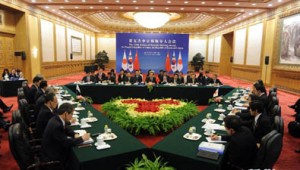 On May the 13th, during the China-Japan-ROK Leaders Meeting, the Chinese Premier Wen Jiabao , South Korean President Lee Myung-bak and Japanese Prime Minister Yoshihiko Noda mutually agreed that this year, China, Japan and South Korea would initiate FTA talks . Based on its existing industrial foundation, Shandong, a major Chemistry industry province and a bridgehead adjacent to Japan and South Korea, it can be the lead in setting up pilot trade cooperation area and petrochemical industry base with these two countries, among which, the cooperation in fields such as marine chemical industries, the green tires, environmental protection industry are the most conspicuous.
On May the 13th, during the China-Japan-ROK Leaders Meeting, the Chinese Premier Wen Jiabao , South Korean President Lee Myung-bak and Japanese Prime Minister Yoshihiko Noda mutually agreed that this year, China, Japan and South Korea would initiate FTA talks . Based on its existing industrial foundation, Shandong, a major Chemistry industry province and a bridgehead adjacent to Japan and South Korea, it can be the lead in setting up pilot trade cooperation area and petrochemical industry base with these two countries, among which, the cooperation in fields such as marine chemical industries, the green tires, environmental protection industry are the most conspicuous.
According to Li Guanghui, deputy director of the Northeast Asia Economic Cooperation and Development Research Center of the Ministry of Commerce, the establishment of the FTA will help the three countries in economic development, energy conservation and environmental protection, trade, logistics, petrochemical, high-tech related industries in aspects such as investment facilitation and market openness, reducing tariff burden and non-tariff barriers. As the pillar industries of the all three countries, the petrochemical industry will achieve a more thorough integration of a more robust development in the process of regional markets integration.
Adjacent to South Korea, the Shandong Province not only enjoys the advantage of location but a favorable chemical industry as well, which is highly complementary with the Japanese and Korean chemical industry. The proposal of setting up regional economic cooperation experimental zones on west coast of Qingdao has been put on the agenda. And the plan for setting up a Regional Development Fund for the establishment of related industries is also under discussion. According to Yuan Xiaoli, deputy director of the Northeast Asia Economic Development Research Center of Qingdao University of Science and Technology, the FTA will give rise to the ocean, commerce, home appliances, chemical, agricultural, and other competitive industries in the region, in this way, all parties win.
Liuyan, Chairman of the Petroleum and Chemical Industry Association of the Shandong Province points out that the Shandong is the first large province in China that is approved to be marine economy pilot province. As Japan and South Korea are also major maritime countries, the cooperation perspective for the three parties is indeed promising. And according to Yan Yongjiang, Secretary-General of the Coating Industry Association of Shandong Province, although Japan has but a few high-end paint enterprises, its production techniques are very advanced. While our needs of marine paint products are expanding, with an average annual growth rate of demand for more than 20%. In addition to the ship and container coatings, marine the demand for anti-corrosion coatings is also huge. This brings opportunities for Shandong Province to seek technical cooperation for enterprises, and meanwhile provides a larger potential market for Japanese and Korean products. Besides, Shandong Province is also a major tire province, while Japan and South Korea’s tire industry also enjoy great strength. At present, Shandong Province is implementing the development strategy of the green tire, and the Free Trade Area will speed the process of integration of Shandong tire companies.
As chemical Province, Shandong Province in recent years implemented local environmental standards that are stricter than the national environmental standards. And it is quickly becoming a leading national market for environmental protection product. According to Li Guangjie, deputy director of the Shandong Provincial Academy of Social Sciences Institute of Economic Research, the energy saving and new energy industries are expected to benefit from the China-Japan-ROK free trade area. He also stressed that, in the past, Shandong Province had undertaken a lot of advantageous Japanese and Korean industries, but it did not master the core technology. Therefore, the next step is the use of Japanese and Korean investment should focus on the new energy, new materials, marine industry, environmental protection, high-end equipment manufacturing and other industries, meanwhile, it should improve the capability of independent innovation, to grasp the initiative of cooperating with Japan and South Korea.





